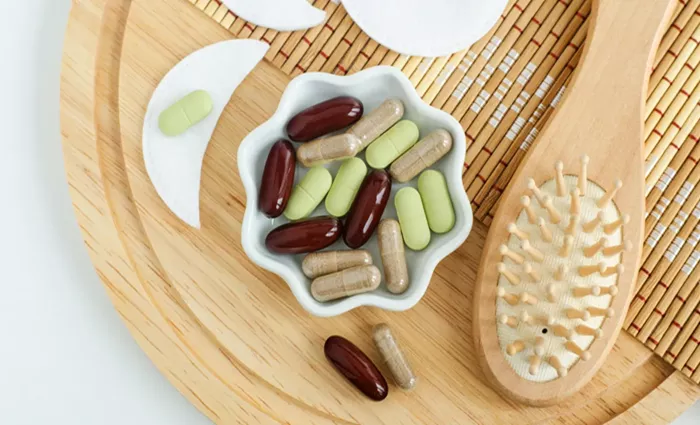Vitamin B Complex: The Foundation of Hair Health
Vitamin B complex is a group of vitamins that play a crucial role in supporting overall health and well-being, including hair growth. Here’s what you need to know about the key B vitamins and their importance for maintaining healthy hair:
Vitamin B7 (Biotin): Often referred to as the “hair growth vitamin,” biotin is essential for the metabolism of fatty acids and amino acids, which are necessary for the production of keratin, the protein that makes up hair. Good dietary sources of biotin include 100% whole grains, meat, fish, whole eggs, nuts, and avocados¹.
Vitamin B12: Another important member of the B vitamin family, vitamin B12 is crucial for maintaining healthy nerve cells and red blood cells, which supply oxygen and nutrients to the scalp and hair follicles. Incorporating foods rich in vitamin B12, such as meat, fish, poultry, eggs, and dairy products, into your diet can help support healthy hair growth¹.
Vitamin D: The Sunshine Vitamin for Hair Health
Vitamin D is known as the “sunshine vitamin” because our bodies produce it in response to sunlight exposure. In addition to its role in bone health and immune function, vitamin D also plays a vital role in promoting healthy hair growth. Here’s why vitamin D is essential for your locks:
Regulates Hair Follicle Cycling: Vitamin D helps regulate the cycle of hair follicle growth, ensuring that new hair strands are continuously produced to replace old ones.
Promotes Healthy Hair: Adequate levels of vitamin D are associated with thicker, stronger hair and reduced hair shedding.
Vitamin E: The Antioxidant Powerhouse for Hair Protection
Vitamin E is a potent antioxidant that helps protect hair follicles from oxidative stress caused by free radicals. Here’s how vitamin E supports healthy hair growth:
Protects Hair Follicles: By neutralizing free radicals, vitamin E helps prevent damage to hair follicles, promoting healthier hair growth.
Improves Blood Circulation: Vitamin E supports healthy blood circulation to the scalp, ensuring that essential nutrients reach the hair follicles, promoting hair growth and preventing hair loss.
Zinc: The Essential Mineral for Hair Growth
Zinc is an essential mineral that plays a vital role in numerous physiological processes, including cell division and tissue growth. Here’s why zinc is crucial for maintaining healthy hair:
Supports Cell Division: Zinc is necessary for cell division, including the cells that make up hair follicles. Adequate zinc levels support healthy hair growth and prevent hair loss.
Prevents Hair Thinning: Zinc deficiency has been linked to hair thinning and shedding, making it important to include zinc-rich foods in your diet.
Iron: The Oxygen Carrier for Hair Follicles
Iron is an essential mineral that plays a critical role in carrying oxygen to the body’s cells, including the cells in the hair follicles. Here’s why iron is essential for healthy hair growth:
Prevents Hair Thinning: Iron deficiency (anemia) can lead to hair thinning and shedding, as insufficient oxygen delivery to the hair follicles impairs their function.
Promotes Hair Growth: Ensuring an adequate intake of iron-rich foods supports healthy hair growth and prevents hair loss.
Balancing Your Diet for Optimal Hair Health
While incorporating specific vitamins and minerals into your diet can support healthy hair growth, it’s important to remember that no single nutrient is a magic bullet. A balanced diet that includes a variety of nutrient-rich foods is key to maintaining overall health and promoting healthy hair growth. Here are some additional tips for optimizing your diet for hair health:
Eat a Variety of Nutrient-Rich Foods: Include a diverse range of fruits, vegetables, whole grains, lean proteins, and healthy fats in your diet to ensure you’re getting a wide range of essential nutrients.
Stay Hydrated: Drink plenty of water throughout the day to keep your body and hair hydrated, as dehydration can lead to dry, brittle hair.
Limit Processed Foods and Sugary Treats: Minimize your intake of processed foods and sugary treats, as these can contribute to inflammation and oxidative stress, which can negatively impact hair health.
Conclusion:
Maintaining healthy hair growth requires a combination of factors, including proper nutrition, adequate hydration, and a healthy lifestyle. By incorporating vitamin-rich foods into your diet and adopting healthy habits, you can support your body’s natural hair growth processes and maintain vibrant, luscious locks for years to come.
For additional information and guidance on promoting healthy hair growth through nutrition, consider consulting reputable sources such as Forbes, Cleveland Clinic Health, and Medical News Today. Remember to consult with a healthcare professional before starting any new supplements or making significant dietary changes to ensure they are appropriate for your individual needs.
you may be interested

